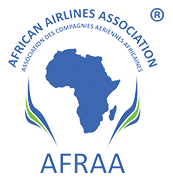
ATN: How would you describe cargo market in Africa in the year so far?
SG: According to IATA, the global air cargo market is showing a drop in demand and contraction in capacity.
The main reasons behind the downturn are the Omicron wave spreading in China and the ongoing Ukraine-Russia war both of which cause supply chain and capacity issues that are limiting the movement of air cargo.
Aside from these extraordinary events, airlines are adding to their air cargo capacity in spite of widespread inflation, pointing to a degree of optimism amidst the challenges. The coming months will be critical in terms of how the various factors influencing air cargo will evolve.
African airlines saw cargo volumes decrease by 6.3% in April 2022 compared to April 2021. This was significantly slower than the growth recorded the previous month (3.1%). Capacity was 1.5% below April 2021 levels.
ATN: How has COVID-19 restrictions in Africa affected your crew and operations?
SG: Compared to 2020/2021, there are fewer restrictions in Africa in 2022, which has resulted in minimum crew and operations disruptions. As an airline, Astral continues to restrict crew layover in key airports such as its base in Nairobi, Dubai and Johannesburg.
ATN: How has blocked funds in various African States affected your operations?
SG: We have been fortunate not to face any problems with blocked funds for air-cargo, as most of our billing is in US Dollars and have not experienced any payment delays for our incoming remittances.
ATN: What is the progress so far of your drones cargo operations?
SG: Our drones operations have been active in 2022, with a record number of contracts in agriculture – like mapping and spraying -, and security surveillance.
In June 2022, Astral Aerial Solutions conducted a BVLOS Demonstration in Limuru, Nairobi with its JV Partners, Swoop.Aero and Skyports in conjunction with the Kenya Civil Aviation Authority, which was very successful.
ATN: How would you describe cargo infrastructure in African States you fly to, and which States is most improved?
SG: The current facilities for cargo-infrastructure is good when it comes to Nairobi, Johannesburg, Lagos, Accra, Addis Ababa, Entebbe and Lusaka, however more needs to be done in other regions in Africa where the infrastructure needs to be upgraded.
More needs to be done with cargo infrastructure in Sub Saharan Africa, especially with Cold Storage facilities, as only 20% of Africa’s Primary Airports have air-side cold-storage facilities, which can handle perishables and most importantly Vaccines.
We urge African airports to rehabilitate and upgrade their cargo-infrastructure to allow for better facilities for perishables and pharma cargoes, in addition to their imports and exports cargo terminals.
Airports will need to encourage private-sector participation under the public-private-partnership (PPP) model as this will result in increase in investments in Infrastructure.
ATN: As a cargo airline, do you encounter market restrictions in any African States as some passenger airlines also complain?
SG: Market-access has improved considerably during the pandemic with many African nations opening their skies to foreign cargo carriers as they struggle with limited inbound passenger capacity. Before the Pandemic, there were a number of countries which imposed restrictions and high taxes on airport and cargo handling fees, however, this has since improved and one can access all the major countries in the continent.
ATN: Would you say SAATM and AfCFTA are working well so far in Africa?
SG: Currently, 35 AU Member States with a total population of more than 800 million people, accounting for 61% of the population on the African continent and 89% of intra-African air transport market have joined SAATM and have opened up their markets to each other, removing restrictions in terms of frequency, capacity and granting to each other traffic rights and this will enable intra-African transport connectivity and support improvement of trade and tourism.
By signing the SAATM Memorandum of Implementation (MOI) the countries commit to revise all their Bilateral Air Service Agreements (BASAs) with other African countries to make them compliant to the provisions of the Yamoussoukro Decision (YD) for full liberalization of air transport services.
Both SAATM and AfCFTA have yet been implemented across the continent, and the benefits of integration will only be felt as from 2023. More needs to be done by AU and the member countries to fully ratify both treaties as it will offer greater opportunities for trade and aviation restart.
ATN: In terms of collaboration and consolidation within Africa, what are your plans regarding other African carriers?
SG: Astral Aviation continues to collaborate with various African airlines notably Kenya Airways, Ethiopian Airlines, SAA, RwandAir, Air Botswana, AirLink, LAM and Air Tanzania. Astral has recently conducted heavy maintenance at the ET MRO in Addis Ababa on its B767F and has received engineering support on its B757F.
African carriers are slow to collaborate amongst themselves hence AFRAA has been taking steps to encourage its member airlines to increase their collaboration under the Route Network Committee which is being chaired by myself.
ATN: What is your projection for cargo for 2022 for Astral Aviation and Africa cargo industry overall?
SG: 2022 will be a tough year for the Air Cargo Industry due to the effects of the Russia-Ukraine war, Spread of Omicron in China and the Global Recession. We expect that China will recover from September 2022 and buoyant air-freight volumes to Africa as China is the largest trade partner of Africa.
Intra-African sector will remain buoyant in 2022 as passenger flights will have not resumed fully to the pre-COVID levels.
ATN: What is your main worry and greatest confidence for cargo in Africa?
SG: On the whole, I remain optimistic with air cargo in Africa especially due to the vibrant intra-African air-cargo market. However, my concerns evolve around the recovery of the economies of various African countries which have been shattered by COVID-19 and the inflationary pressures caused by the geo-political situation in Russia and Ukraine.
Africa is a net-importer of fuel and commodities, hence the effects of a prolonged war will result in further hardships and slow-down in growth and trade.
I remain confident with the health of Africa as it recovers from COVID-19. While vaccines uptake remains low, the number of casualties are at the lowest levels. Political stability and insecurity continue to improve in various regions in Africa and the willingness to trade more between African nations will pave the way for future growth.
ATN: How have you managed fuel and other costs in Africa?
SG: Aviation fuel continues to remain high in mid-2022 compared to record low-levels in 2020. Astral purchases its fuel once a month and prefers not to hedge, hence it is forced to pass-on majority of the fuel costs to its clients in the form of surcharges.
Taxes remain a major concern for the aviation industry in Africa which has the highest tax-regime in the world with over 50 types of taxes levied on cargoes by Governments. We appeal for the reduction and removal of taxes on aviation services and fuel, as this will enable the aviation industry to recover from the downturns of COVID-19 and the geo-political crisis in Ukraine and Russia.
Source: Air Transport News
